 |
 |
 |
 |
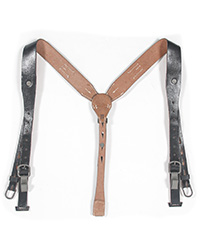
|
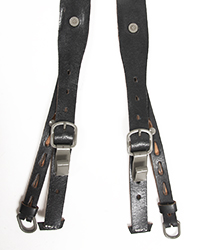
|
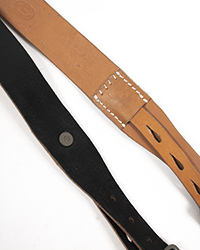
|
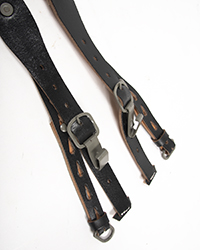
|
|
Texled M40 Y-straps, Long
|
Correct steel hooks
|
Hidden stitch, steel rivets
|
Auxiliary straps with teardrop
holes and studs
|
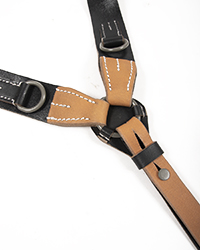
|
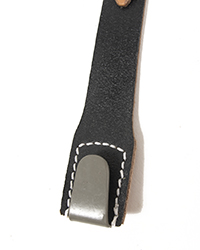
|
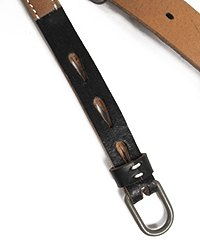
|
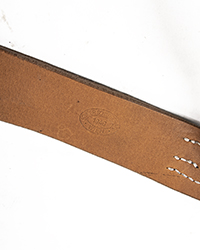
|
Proper size and positioned
D-rings
|
WWII pattern backstrap
|
Typical elongated D-rings
|
Maker marked and dated.
|
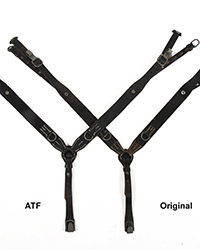
|
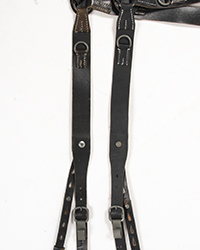
|
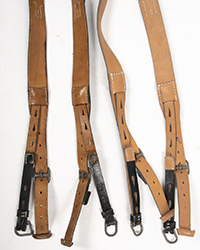
|
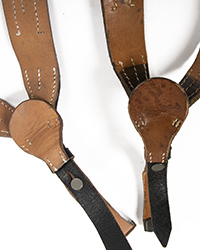
|
Do they look like originals? Maybe...
Note: The backstrap can be folded
either toward the outside
or to the inside. Both methods
are seen on WWII straps.
Comparison is with regular
size Y-straps
|
Note: I blackened ours for
the comparison photos to
better match the original.
Comparison is with regular
size Y-straps
|
Original (L) vs. ATF (R)
Comparison is with regular
size Y-straps
|
ATF (L) vs. WWII (R)
Note: Some originals were blackened
where the shoulder straps is
folded around the O-rings. Others
were not- it's just a variation.
|
|
|
|
|
|
|
|
|
|
|
Long version of the Texled M40 Ystraps. This size is advisable for anyone over 6ft in height.
Top quality reproduction of the first pattern of the WWII German combat Y-straps. This style was made and issued from sometime in 1940 until 1942-43 and worn through the end of the conflict. These particular reproductions are exclusive to ATF and are not available anywhere else. They are made from top grade 8oz. leather, flesh side out, exact and correct reproduction hardware, hand sewn, and copied directly from an original example.
The main feature that distinguishes Y-straps made in the first half of WWII is the hidden stitch used on the covers for the rivets that attach the auxiliary straps. This is a mark of high quality saddlery, made by carefully cutting slits in the side of the strap and carefully sewing at an angle. Stitching this way was purely for cosmetic reasons- by 1942-43 someone figured out it was a waste of time...
Other traits of the early Y-straps were auxiliary straps with elongated D-rings that adjust by means of a stud and teardrop shaped holes, and the large D-rings on the back are placed much close to the O-ring than on later production straps.
Our back straps are the correct WWII pattern and size.
Marked with an original maker name and dated 1940.
Yes, they cost a little more than most other reproductions- but these are nothing like most other reproductions. Ours look like actual WWII issue gear- they lack the hyper-farb hardware, chunky backstraps, lollipop adjustment holes, brass rivets and sultry aroma of the bargain barn pieces.
Long Originals? I developed the pattern for these in 1997 based on a damaged original- all that remained was the O-ring, main shoulder straps and the tongue. They were heavily worn, but appeared to be "factory". Since we moved to Columbia in 2001 I have not been able to find them nor have I ever encountered another original example. It's possible that the set I had were made at unit level.
Backstrap note: Reenactors prefer the back strap to be folded toward the outside which shows the brown color of the underside. In WWII, they were worn either way- my original was folded toward the inside so that's why it's set up that way in the comparison photos. The WWII example was a bit stiff and I feared it would crack if I tried to reverse it. If you cull through period photos, one can find them being worn both ways- just for "proof".
Imported
|
|
 |
 |
 |
 |

|